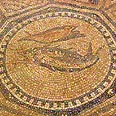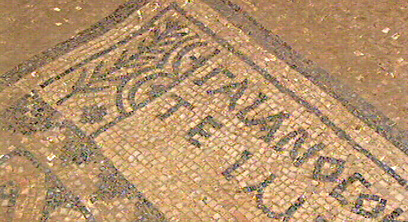
Tens of prisoners at the high-security prison where 1,200 security prisoners are held helped in the archeological digs that led archeologist to the exceptional discovery.
The Israel Prison Services approached the government for a construction permit in the Megiddo area where it had planned to expand the prison by few new compounds yet the Israel Antiquities Authority demanded the government uphold constructions, paving the way for archeological digs in the area.
The Megiddo area is known as a rich terrain for archeological findings from different historical ages.
The prison services allowed archeologists draft prisoners to their digs where a number of coins and crockery have been found since February.
Two weeks ago diggers discovered what seems to be an architectural structure which was later identified as the remains of a church. Archeologists identified a spectacular mosaic floor and the foundations of a building dating back to the third or fourth century CE.

Church's ruins showing Greek inscriptions (Photo: Channel 2)
The discovery sent joyous waves among archeologists working on the project who soon realized the magnitude of the discovery.
Ornaments paved the foundations of the church where inscriptions and biblical citations in old Greek were found.
One of the inscriptions read that the building was dedicated to “the memory of the Lord Jesus Cristos.”
Yotam Tefer, the dig’s supervisor, said that “Christian religious buildings from that period are rare archeological findings in the Land of Israel. Mosaics in general and mosaics with inscriptions from the third and fourth centuries CE are the rarest. This is a unique building which important for an initial understanding of Christianity as a well-known and official religion,” Tefer said.
In the center of the building the ruins of an altar were found. Archeologists noted that the ruins date from a period that preceded the crucifix as the official ecclesiastical emblem, which explains why fish-shaped decorations were found on most of the mosaic. The fish symbol is known to be the symbol of early Christianity.
Digs in the western parts of the prison discovered residential structures of communities dating to the Byzantine epoch of the fourth and sixth centuries CE.
A Jewish cleansing bath from the Roman period was found in archeological rubble retrieved from that area.
Shoka Dorfman of the Israel Antiquities Authority said that consultations with leading archeologists will be launched next week to discuss the future of the findings.
The Israel Prisons Authority told Ynet: “We are waiting for the decisions of the Antiquities Authority to see whether the rare findings will be taken to another location or will remain in place. We will build another two buildings to complete the compound, yet in the wake of the discoveries we will decide how to proceed with constructions at a later date.”















